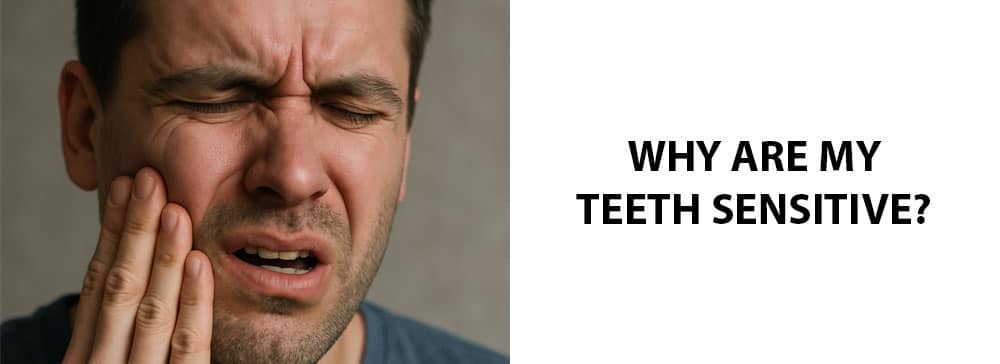Have you ever taken a sip of something cold and felt that painful zing in your teeth? If you’ve wondered, “Why are my teeth sensitive?” you’re definitely not alone. That pain you feel is your mouth’s way of telling you something is wrong and needs attention. It’s important to identify what’s causing the sensitivity so you can address any underlying issues before they escalate into much bigger problems. Our offices are conveniently located near West Valley, North Salt Lake, Bountiful, Sandy, Lehi, and Magna.
What Are Sensitive Teeth?
Your teeth become sensitive when the protective layers wear down, making them react to things like cold, heat, or sweets more than normal. You might notice it when you brush, eat, or even breathe in cold air. It’s not that your teeth are weak, but rather that something underneath the surface is being exposed.
What Causes Sensitive Teeth?
The enamel on your teeth is like a shield, keeping the inside layers safe from anything too hot, cold, or acidic. Underneath that hard shell is a layer called dentin, which has tiny pathways that lead straight to the tooth’s nerves. When enamel gets thinner or your gums recede, those pathways become exposed. This can happen for a few reasons, like brushing too hard, grinding your teeth, eating a lot of acidic foods, or just natural wear over time. Even teeth-whitening products or gum issues can make things worse.
Treatments For Sensitive Teeth
Toothpaste for sensitivity and fluoride treatments are usually the first line of defense, helping strengthen enamel and calm nerve reactions. But if those don’t fully solve the problem, there are other treatments your dentist can recommend. Desensitizing gels or bonding agents can cover exposed areas and block pain signals. For gum recession, a minor gum graft might be used to protect the roots and reduce sensitivity. In some cases, sealants are applied to add an extra layer of protection over vulnerable spots. And if teeth grinding is to blame, wearing a custom night guard can prevent further enamel damage.
Possible Problems If You Don’t Get Them Treated
If you ignore sensitive teeth, the problem usually doesn’t just go away. Here are some issues that can show up over time:
- Worsening enamel damage: The protective layer keeps wearing down, leaving teeth even more vulnerable.
- Increased pain: What starts as mild sensitivity can turn into sharp, lingering pain.
- Tooth decay: Exposed areas are easier for bacteria to attack, leading to cavities.
- Gum recession: Ongoing irritation can cause gums to pull back further, exposing more of the tooth root.
- Infection or abscess: If bacteria reach the inner layers, it can lead to painful infections that may require major dental treatment.
- Cracked or chipped teeth: Weak spots are more likely to fracture under pressure from chewing or grinding.
- Difficulty eating or drinking: Sensitivity can make it hard to enjoy everyday foods and drinks.
When Should You See a Dentist
If your teeth feel sensitive every once in a while, it’s usually nothing to panic about. But if that twinge turns into a regular thing, it’s a sign you should see a dentist. Ongoing sensitivity generally means there’s deeper problems happening.
A dentist can figure out whether it’s something simple, like enamel wear, or something more serious, like a cavity, infection, or gum issue. The earlier you get checked out, the easier it is to treat the problem before it turns into constant pain or major dental work. Even if the sensitivity doesn’t seem too bad, it’s always worth finding out what’s really causing it rather than just dealing with the discomfort.
What Causes Throbbing Pain and Temperature Sensitivity In a Tooth?
When your tooth pain gets to the point of throbbing, you know things are really getting serious. Mild sensitivity usually points to worn enamel or slight gum recession, but when the pain becomes intense, it can mean the inner layers of your tooth are exposed or inflamed. This often happens when enamel erosion has progressed too far, a cavity has reached the nerve, or the gums have receded enough to uncover the roots completely.
Tooth Sensitivity Prevention
Here are some of the best ways to prevent sensitive teeth and keep your smile comfortable:
- Brush gently and practice good brushing habits – Use a soft-bristled toothbrush, brush twice a day for two minutes, and don’t forget to floss to remove buildup near the gumline.
- Switch to toothpaste for sensitive teeth – These formulas help block pain signals from reaching the nerves inside your teeth.
- Avoid overly acidic foods and drinks – Things like soda, citrus, and vinegar-based foods can erode enamel over time.
- Don’t grind your teeth – If you clench or grind, especially while sleeping, talk to your dentist about a night guard.
- Keep up with regular dental visits – Routine checkups help catch problems early before they lead to lasting sensitivity.
- Limit teeth whitening treatments – Overdoing whitening products can strip enamel and increase sensitivity.
- Rinse with fluoride mouthwash – It helps strengthen enamel and makes teeth more resistant to irritation.
Why Are My Teeth Sensitive: Conclusion
When you first start noticing your teeth becoming overly sensitive, don’t just ignore it. More than likely, you have some underlying issues and your discomfort is a signal to get things checked out. Whether you’re noticing symptoms of sensitive teeth or have other questions about your oral health, give us a call at Utah Periodontal Specialists. With convenient locations in Salt Lake City and South Jordan, it’s easy to find expert care close to home and get the help you need to keep your smile healthy.



Recent Comments